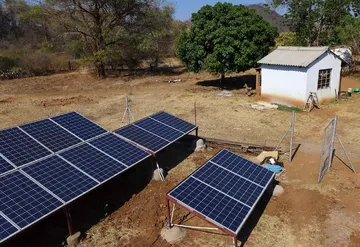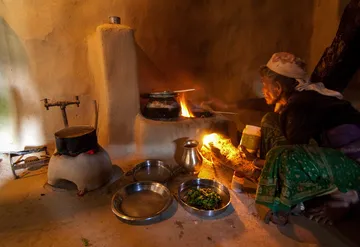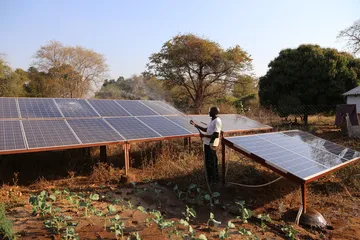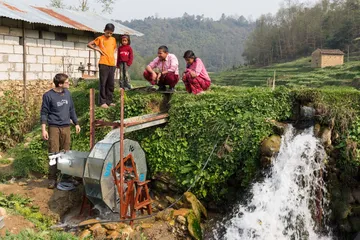Challenge
Worldwide about one billion people - especially in rural areas and very remote regions - have no access to electricity. Their energy sources are mainly wood, plant remains and animal dung. They use it to cook with open fires and to heat their homes. If they are connected to the electricity grid, their everyday lives are very often marked by power outages that can last for hours or even weeks.
However, access to cheap and reliable electricity is essential for sustainable development and particularly important in education, business and health sectors. Without electricity, it is not possible for teachers to have modern lessons at a school, nor for farmers to run water pumps to irrigate their fields. Power cuts during operations in hospitals can have fatal consequences.
The energy problem in developing countries is amplified by the fact that in these countries the energy demand per capita is rising and the population growth is often higher than the electrification rate. Historical developments show that the high birth rates in developing countries usually do not decline significantly until a certain economic development has been achieved and for that access to reliable and affordable electricity would be required. This must be enabled by renewable energies, especially in rural regions in developing countries, in order to reduce greenhouse gas emissions, prevent further population growth and reduce local poverty.
Chances
However, the rapidly increasing demand for energy is met by the enormous potential for renewable energy systems in developing countries. Sunny regions offer almost perfect conditions for photovoltaic systems. For example, the average annual solar radiation in Zimbabwe is over 2100 kWh per square meter and is thus about twice as high as in Germany. Mountain regions, such as the Himalayas, have immense hydropower potential. The technically usable potential in Nepal, for example, is estimated at around 40,000 megawatts and is thus one of the highest per capita potentials in the world. So far, however, only two percent of this potential has been tapped. These resources can be used with appropriately adapted technologies.
Research at the chair
Research at the chair The Chair of Renewable and Sustainable Energy Systems is dealing with the energy problems in developing and emerging countries and has been implementing concrete pilot projects in Zimbabwe, Nepal and India since many years. In the future, we will also work in Ghana in cooperation with the TUM.Africa partner university KNUST.
Our thematic focus is on:
- Decentralized energy systems for developing countries (0.2kW - 100kW)
- Small-scale hydropower
- Low-tech and low-cost solutions for single components of energy system developing countries
- Decentralized Energy-Water-Food systems for developing countries
- Least-cost design of coupled systems such as photovoltaics with battery storage and biogas motors
- On-site measurements and surveys
- Knowledge transfer in developing countries
- Training of local users
- Analysis of social, cultural and economic aspects
- Feasibility studies
Contact person: Stephan Baur and Sissi Bazan
Zimbabwe
TUM has been cooperating with the community of St. Rupert Mayer in rural Zimbabwe since more than ten years. After numerous student projects on site, the first Energy-Water-Food system of its kind is currently being installed there. Thereby solar-powered water pumps enable a significant increase in agricultural productivity. From the biomass residues sufficient biogas can be generated in biogas digesters in order to ensure the power supply of the community by using controllable gas motors during times when no or too little electricity is generated by photovoltaics. This and the flexible use of the water pumps drastically reduce the need for batteries or electricity from diesel generators, which leads to significantly reduced power generation costs. The ENS investigates least-cost modeling of these systems as well as their technical and socio-economic feasibility.
Media coverage
Article "Dezentrale Energy-Water-Food-Systeme für Afrika" in the TUMcampus magazine 5/2018 (page 48): www.tum.de/fileadmin/w00bfo/www/TUMcampus/2018_4/TUMcampus_18_4_Web.pdf
Short video on decentral Energy-Water-Food systems by the high school students from St. Rupert Mayer, Zimbabwe: https://www.youtube.com/watch?v=DpDQjUu5jtk
Video on the measurements and surveys for Energy-Water-Food systems conducted by the students of ENS: https://www.youtube.com/watch?v=pVoBIFUsDfA
Nepal
Many areas of Himalayan Nepal are yet to be connected to the national electricity grid. Around seven million people still live without electrical energy access, especially in the hilly regions in the Northeast and the Northwest of the country. The Chair of Renewable and Sustainable Energy Systems is engaged in multiple pilot projects in rural Nepal to improve energy access, and maintains close co-operation with various partners such as local companies and manufacturers. Most notably, we work together with Kathmandu University.
We are particularly active at Lophelling-Boarding-School (LBS) in the Manang District near the Nepal-Tibet border. In 2015, a team of students installed a solar water heating system at the school, and in 2018, the system was extended with a PV-wind hybrid energy system to provide uninterrupted electricity for the pupils and the teachers. A battery bank was also installed for load balancing.
Furthermore, a low-tech waterwheel has been developed at the Chair of Renewable and Sustainable Energy Systems to provide affordable energy in rural regions. The concept is under constant improvement, and a first pilot system was installed near Kathmandu in 2018.
Media coverage
German article on the waterwheel, „Wasserräder für Nepal“, in TUMcampus Magazin 1/2015 (pp. 48-49): www.tum.de/fileadmin/w00bfo/www/TUMcampus/Archiv_Pdf_Lesezeichen/2015_1_TUMcampus_WEB.pdf
Short video of the first test run of the pilot system near Kathmandu: www.youtube.com/watch
Short film about the waterwheel project at the Bergfilm-Festival Tegernsee 2018: https://www.youtube.com/watch?v=4-jOwai3BPo&t=10s
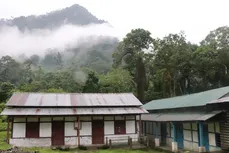
India
Many of the most remote communities in India still lack electricity. TUM ENS team researched electrical demand in villages in Arunachal Pradesh to understand the feasibility of minigrid systems in providing sustainable power. With its partners in India – the NGO “Further and Beyond”, the microgrid developer “Mera Gao Power” and the university partner “IIT Guwahati” – the TUM research team developed a prototype minigrid system in a remote location. Preliminary research including an energy demand survey was conducted in the summer of 2018.
Finally, in July 2019, two master students of TUM installed a renewable off-grid energy system in the small village of Jamupani in the North-East of India. The system consists of a micro-hydro turbine, multiple PV panels and battery storage. The plant supplies the small village and a local governmental school with continuous power. The school accommodates about 50 students up to grade 8 from all over the district. Thanks to electric lighting, the pupils are already showing improved learning outcomes. The energy system was designed to meet the energy needs of the village and the school as accurately as possible. When designing the system, special emphasis was placed on robustness and ease of use.
During the whole project the TUM team was actively supported by the local population and local companies and thus the different competences could be bundled.
Media coverage
Short film about the minigrid project in Jamupani (video editing Gretta Sammalniemi): https://www.youtube.com/watch?v=SEQRCZz_Bvk&feature=youtu.be
